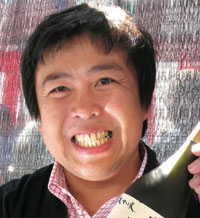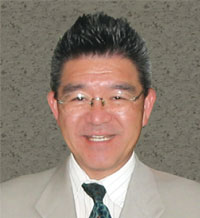Beautiful Japanese cuisine created by a young chef who won the "Rising Star" award
By Elli Sekine
“Ju-Ni”, which opened recently in the popular NOPA district where more and more trendy restaurants and cafés are coming in, is one of those places which people are talking about for their Japanese cuisine influence, the newest trend.
They have been open only for a short time, but the restaurant is already so busy you cannot make a reservation until three months ahead. All they have as the eating space is a chef counter with 12 seats. Every 4 seats are well taken care of by one chef. The name “Ju-Ni (twelve)” derives from this concept. The owner/chef, Geoffrey Lee, recently won the title of the rising star (the rookie of the year award of the sushi chef division) by the local paper, “San Francisco Chronicle”, which gave him instant fame in the cooking scene. He is only 32 years old. It is quite an achievement that he has surpassed Japanese sushi chefs.
Mr. Lee is Chinese American. He was born and raised in the San Francisco Bay area. “I want people to taste authentic Japanese food made in San Francisco,” says Mr. Lee. He became enchanted by Japanese food when he was still in school working part-time at a Japanese restaurant. At the beginning of his career, he was mainly making sushi rolls. While he was working at a high-end Japanese restaurant, “Sushi Ran”, he experienced an awakening. He learned the depth of sushi. He decided to become a high-end sushi chef, and started to re-learn and master the basics such as how to make sushi rice, and how to cut fresh fish properly. The places where he worked and learned those skills are all top 10 level sushi restaurants in the Bay area. This is his first restaurant he runs himself, and there is no Japanese staff. All the associates were born and/or raised in the U.S. Here, his creative menu where Californian food culture is reflected is receiving great reviews.
A restaurant with only 12 seats may give you an image of a very small place; however, it actually is unexpectedly spacious. The main counter is wide and deep. The interior decoration is simple and clean with hanging plants and abstract paintings. The food plates served on the counter must be the main art. The menu offers omakase style dishes and a-la-carte dishes you can order afterwards. After the salad and the appetizer, 12 different individual sushi is served. The course finishes with owan and the dessert. The Today’s salad was more Californian than Japanese prepared with fresh Californian vegetables including beets, and looked and tasted elegant. Next, bite-size oysters refresh your mouth and prepare it for the next sushi course. You can also add special menu items to the course at the same time. Today’s specials included a set of zuke maguro, seaurchin, and shirayaki ($34). Food science is used for Mr. Lee’s plates from checking the ultimate temperature of each sushi for well-balanced combination to caring for one drop of soy sauce to maximize umami in your mouth. For example, he slightly scorches, adds acidity with a few drops of lemon juice, salt, herbs, or cooks and sprinkles bonito powder on the food. He is fastidious about such details, and creates plates that are so artistic to look at. The last course item is A5 rank wagyu from Miyazaki prefecture. Despite of the small bite size, it is very satisfying and worthwhile. The general course menu, priced at $90 for these contents is relatively reasonable among other fellow SF restaurants with the tendency of increasing in price.
The vegetables are procured from the local farmers, and 90% of the fish is from Tsukiji. Also, whenever fresh local seasonal fish becomes available, they get it from there. Mr. Lee is very selective about the fish he gets including how it is caught, and the work ethic of the Fishermen. He is also carrying over the rule and spirit of Japanese cuisine – “Do not waste food ingredients!” By using up all the ingredients for 24 people every night, the sustainability of the business is realized. For the customers, it is a big point that they can always expect freshest ingredients.
For drinks, they carry 15 sake brands, wine, and beer. The premium sake Mr. Lee is particular about are imported from all over Japan, and a detailed description of each paring is offered.
Until recently, non-Japanese sushi chefs were rarely featured in the media. Now, we are definitely in a different era. As presented in the comment of Mr. Lee, “Sushi is simple, yet complicated at the same time”, non-Japanese first class sushi chefs who understand the delicate process of Japanese cuisine are beginning to arise. And tonight, four of such chefs were exhibiting the skills in front of the entertained customers at Ju-Ni’s counter.
「ライジングスター」に輝いた若手シェフが創作する和の美食
トレンディなレストランやカフェが増えている人気のエリア、ノパ地区にオープンした「Ju-Ni」は、今最も旬な和食スタイルを取り入れた話題の店。開店後まもなく3カ月先まで予約が取れない状態が続いている。たった12席のシェフカウンターのみ。各4席に1人のシェフが客を手厚くもてなすというコンセプトから「Ju-Ni」という店名が付けられた。オーナーシェフ、ジョフリー・リー氏は最近、地元新聞「サンフランシスコ・クロニカル」で「ライジングスター」(寿司シェフ部門の新人賞)に輝き、料理界で一気にその名前が知られるようになった。若干32歳、日本人寿司シェフをも出し抜き選ばれた快挙である。
リー氏は、生まれも育ちもサンフランシスコ、ベイエリアのチャイニーズアメリカン。「サンフランシスコメイドの本格派和食を味わっていただきたい」という彼は、学生時代に日本食レストランでアルバイトをしたのがきっかけで和食の魅力にとりつかれたという。最初はロール中心の寿司を握っていたが、ハイエンドレストラン、「Sushi Ran」に勤めた時ある” 気づき” があった。寿司の奥深さを知った彼はその後ハイエンドの寿司シェフを目指し、米の炊き方から魚の切り方を丁寧に学んでいった。修行したレストランもベイエリアでトップ10に入る寿司屋ばかりだ。今回初めての経営となる同店に日本人は一人も働いていない。全員がアメリカ育ちのシェフとスタッフによる構成だ。ここではカリフォルニアの食文化を取り込んだリー氏の独創的なメニューが高い評価を得ている。
12席のレストランと聞くとこじんまりしたイメージだが、店内は予想以上に広く、メインのカウンターはゆったりとした幅と奥行きにレイアウトされている。シンプルで清潔感が漂うインテリアは壁かけ植物や抽象画があるだけだ。
テーブルに置かれるプレートこそが最大のアートなのだろう。メニューは、オマカセと食事のあとに注文できるアラカルトがある。サラダとアペタイザーの後、寿司一貫ずづのコースが12品続き、お椀とデザートで締めくくる。品目に出てくる[本日のサラダ」は、和食というよりカリフォルニアの新鮮な野菜にビーツが加わり、ドレッシングや仕上げもエレガントに飾られていた。次に一口サイズの絶品オイスターが口の中をリフレッシュし次の寿司コースの食欲に備えられる。並行して特別メニューも加えることもできる。今日は漬け中トロ、海水雲丹、白焼きをセット($34)などがあった。リー氏は寿司一つ一つを最高の温度、バランスが良い組み合わせを計り、1滴の醤油に至るまで口の中で旨味が十分味わえるよう食科学をも駆使したプレート作りをしている。例えば、少し炙りをかける、酸味を加える、レモンを数滴たらす、塩、薬味、調理した鰹節をパウダーのように振りかけるなど、細部までこだわり、見た目も芸術的に仕上げる。コースの最後には、宮崎産、A5の和牛の握りが盛られる。一口サイズなのだが、その脂のノリと柔らかさで、満足度の高い一品が価値観を齎せている。この内容でコース料理は$90 ~ と比較的リーズナブルだ。高騰するサンフ ランシスコのレストランの中でも価値が高い。
食材の仕入れは、野菜は地元農家から、魚は90パーセント築地から仕入れている。しかし近海で旬の良い魚が水揚げされれば即座に現地から調達している。漁師達の漁獲法やマナーにもこだわって厳選している。また、日本食の心得である「食材を無駄にしない」精神も受け継いでおり、一晩に24人分の食材を無駄なく使い切ることにより、サステイナブル経営を実践している。客にとってはいつも新鮮なネタが期待できるというメリットがある。
ドリンクは、15種類の日本酒とワイン、ビールを揃えている。日本酒はリー氏が拘るプレミアム酒を全国から取り寄せ、味やペアリングの対象を詳しく記述されている。
今までノンジャパニーズの寿司シェフはクローズアップされてこなかった。しかし時代は確実に変わっている。「寿司はシンプルだけど複雑だ」というリー氏のコメントに代表されるように、繊細な和食のプロセスを理解するノンジャパニーズの一流シェフが登場し始めている。今夜も4人のシェフ達が12のシェフカウンターで、その手腕を光らせ客を楽しませていた。
Ju-Ni
1335 Fulton Street
Ste 101
San Francisco, CA 94117
415-655-9924
www.junisf.com
Mon-Thu: 5:30 pm - 10:30 pm
Thu-Sat: 5:30 pm - 11:30 pm
Closed on Sunday
“Ju-Ni”, which opened recently in the popular NOPA district where more and more trendy restaurants and cafés are coming in, is one of those places which people are talking about for their Japanese cuisine influence, the newest trend.
They have been open only for a short time, but the restaurant is already so busy you cannot make a reservation until three months ahead. All they have as the eating space is a chef counter with 12 seats. Every 4 seats are well taken care of by one chef. The name “Ju-Ni (twelve)” derives from this concept. The owner/chef, Geoffrey Lee, recently won the title of the rising star (the rookie of the year award of the sushi chef division) by the local paper, “San Francisco Chronicle”, which gave him instant fame in the cooking scene. He is only 32 years old. It is quite an achievement that he has surpassed Japanese sushi chefs.
Mr. Lee is Chinese American. He was born and raised in the San Francisco Bay area. “I want people to taste authentic Japanese food made in San Francisco,” says Mr. Lee. He became enchanted by Japanese food when he was still in school working part-time at a Japanese restaurant. At the beginning of his career, he was mainly making sushi rolls. While he was working at a high-end Japanese restaurant, “Sushi Ran”, he experienced an awakening. He learned the depth of sushi. He decided to become a high-end sushi chef, and started to re-learn and master the basics such as how to make sushi rice, and how to cut fresh fish properly. The places where he worked and learned those skills are all top 10 level sushi restaurants in the Bay area. This is his first restaurant he runs himself, and there is no Japanese staff. All the associates were born and/or raised in the U.S. Here, his creative menu where Californian food culture is reflected is receiving great reviews.
A restaurant with only 12 seats may give you an image of a very small place; however, it actually is unexpectedly spacious. The main counter is wide and deep. The interior decoration is simple and clean with hanging plants and abstract paintings. The food plates served on the counter must be the main art. The menu offers omakase style dishes and a-la-carte dishes you can order afterwards. After the salad and the appetizer, 12 different individual sushi is served. The course finishes with owan and the dessert. The Today’s salad was more Californian than Japanese prepared with fresh Californian vegetables including beets, and looked and tasted elegant. Next, bite-size oysters refresh your mouth and prepare it for the next sushi course. You can also add special menu items to the course at the same time. Today’s specials included a set of zuke maguro, seaurchin, and shirayaki ($34). Food science is used for Mr. Lee’s plates from checking the ultimate temperature of each sushi for well-balanced combination to caring for one drop of soy sauce to maximize umami in your mouth. For example, he slightly scorches, adds acidity with a few drops of lemon juice, salt, herbs, or cooks and sprinkles bonito powder on the food. He is fastidious about such details, and creates plates that are so artistic to look at. The last course item is A5 rank wagyu from Miyazaki prefecture. Despite of the small bite size, it is very satisfying and worthwhile. The general course menu, priced at $90 for these contents is relatively reasonable among other fellow SF restaurants with the tendency of increasing in price.
The vegetables are procured from the local farmers, and 90% of the fish is from Tsukiji. Also, whenever fresh local seasonal fish becomes available, they get it from there. Mr. Lee is very selective about the fish he gets including how it is caught, and the work ethic of the Fishermen. He is also carrying over the rule and spirit of Japanese cuisine – “Do not waste food ingredients!” By using up all the ingredients for 24 people every night, the sustainability of the business is realized. For the customers, it is a big point that they can always expect freshest ingredients.
For drinks, they carry 15 sake brands, wine, and beer. The premium sake Mr. Lee is particular about are imported from all over Japan, and a detailed description of each paring is offered.
Until recently, non-Japanese sushi chefs were rarely featured in the media. Now, we are definitely in a different era. As presented in the comment of Mr. Lee, “Sushi is simple, yet complicated at the same time”, non-Japanese first class sushi chefs who understand the delicate process of Japanese cuisine are beginning to arise. And tonight, four of such chefs were exhibiting the skills in front of the entertained customers at Ju-Ni’s counter.
「ライジングスター」に輝いた若手シェフが創作する和の美食
トレンディなレストランやカフェが増えている人気のエリア、ノパ地区にオープンした「Ju-Ni」は、今最も旬な和食スタイルを取り入れた話題の店。開店後まもなく3カ月先まで予約が取れない状態が続いている。たった12席のシェフカウンターのみ。各4席に1人のシェフが客を手厚くもてなすというコンセプトから「Ju-Ni」という店名が付けられた。オーナーシェフ、ジョフリー・リー氏は最近、地元新聞「サンフランシスコ・クロニカル」で「ライジングスター」(寿司シェフ部門の新人賞)に輝き、料理界で一気にその名前が知られるようになった。若干32歳、日本人寿司シェフをも出し抜き選ばれた快挙である。
リー氏は、生まれも育ちもサンフランシスコ、ベイエリアのチャイニーズアメリカン。「サンフランシスコメイドの本格派和食を味わっていただきたい」という彼は、学生時代に日本食レストランでアルバイトをしたのがきっかけで和食の魅力にとりつかれたという。最初はロール中心の寿司を握っていたが、ハイエンドレストラン、「Sushi Ran」に勤めた時ある” 気づき” があった。寿司の奥深さを知った彼はその後ハイエンドの寿司シェフを目指し、米の炊き方から魚の切り方を丁寧に学んでいった。修行したレストランもベイエリアでトップ10に入る寿司屋ばかりだ。今回初めての経営となる同店に日本人は一人も働いていない。全員がアメリカ育ちのシェフとスタッフによる構成だ。ここではカリフォルニアの食文化を取り込んだリー氏の独創的なメニューが高い評価を得ている。
12席のレストランと聞くとこじんまりしたイメージだが、店内は予想以上に広く、メインのカウンターはゆったりとした幅と奥行きにレイアウトされている。シンプルで清潔感が漂うインテリアは壁かけ植物や抽象画があるだけだ。
テーブルに置かれるプレートこそが最大のアートなのだろう。メニューは、オマカセと食事のあとに注文できるアラカルトがある。サラダとアペタイザーの後、寿司一貫ずづのコースが12品続き、お椀とデザートで締めくくる。品目に出てくる[本日のサラダ」は、和食というよりカリフォルニアの新鮮な野菜にビーツが加わり、ドレッシングや仕上げもエレガントに飾られていた。次に一口サイズの絶品オイスターが口の中をリフレッシュし次の寿司コースの食欲に備えられる。並行して特別メニューも加えることもできる。今日は漬け中トロ、海水雲丹、白焼きをセット($34)などがあった。リー氏は寿司一つ一つを最高の温度、バランスが良い組み合わせを計り、1滴の醤油に至るまで口の中で旨味が十分味わえるよう食科学をも駆使したプレート作りをしている。例えば、少し炙りをかける、酸味を加える、レモンを数滴たらす、塩、薬味、調理した鰹節をパウダーのように振りかけるなど、細部までこだわり、見た目も芸術的に仕上げる。コースの最後には、宮崎産、A5の和牛の握りが盛られる。一口サイズなのだが、その脂のノリと柔らかさで、満足度の高い一品が価値観を齎せている。この内容でコース料理は$90 ~ と比較的リーズナブルだ。高騰するサンフ ランシスコのレストランの中でも価値が高い。
食材の仕入れは、野菜は地元農家から、魚は90パーセント築地から仕入れている。しかし近海で旬の良い魚が水揚げされれば即座に現地から調達している。漁師達の漁獲法やマナーにもこだわって厳選している。また、日本食の心得である「食材を無駄にしない」精神も受け継いでおり、一晩に24人分の食材を無駄なく使い切ることにより、サステイナブル経営を実践している。客にとってはいつも新鮮なネタが期待できるというメリットがある。
ドリンクは、15種類の日本酒とワイン、ビールを揃えている。日本酒はリー氏が拘るプレミアム酒を全国から取り寄せ、味やペアリングの対象を詳しく記述されている。
今までノンジャパニーズの寿司シェフはクローズアップされてこなかった。しかし時代は確実に変わっている。「寿司はシンプルだけど複雑だ」というリー氏のコメントに代表されるように、繊細な和食のプロセスを理解するノンジャパニーズの一流シェフが登場し始めている。今夜も4人のシェフ達が12のシェフカウンターで、その手腕を光らせ客を楽しませていた。
Ju-Ni
1335 Fulton Street
Ste 101
San Francisco, CA 94117
415-655-9924
www.junisf.com
Mon-Thu: 5:30 pm - 10:30 pm
Thu-Sat: 5:30 pm - 11:30 pm
Closed on Sunday






